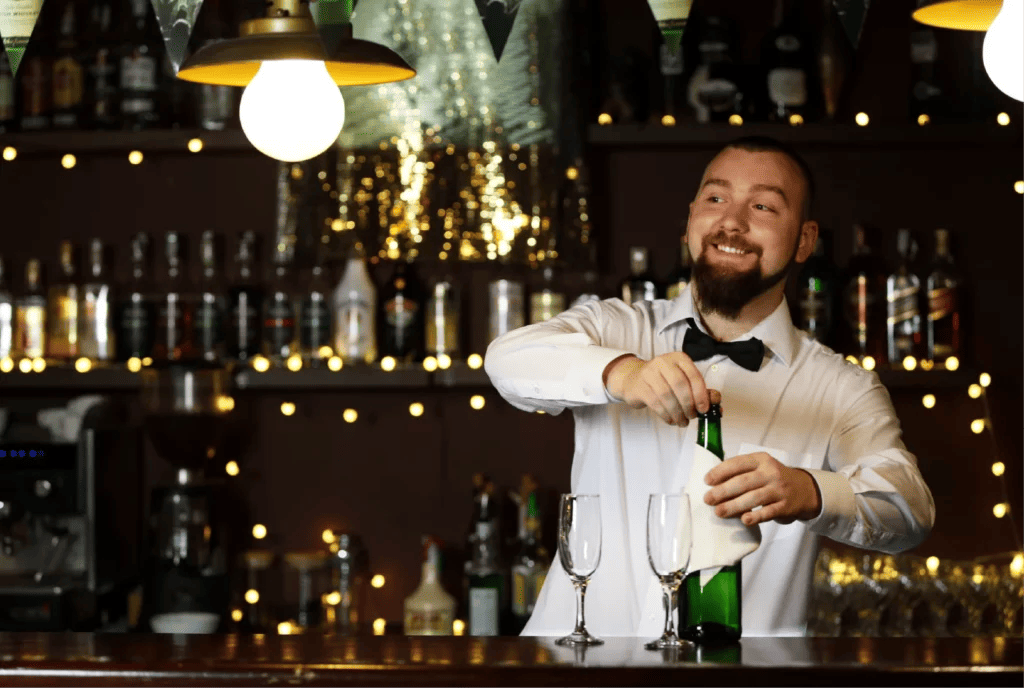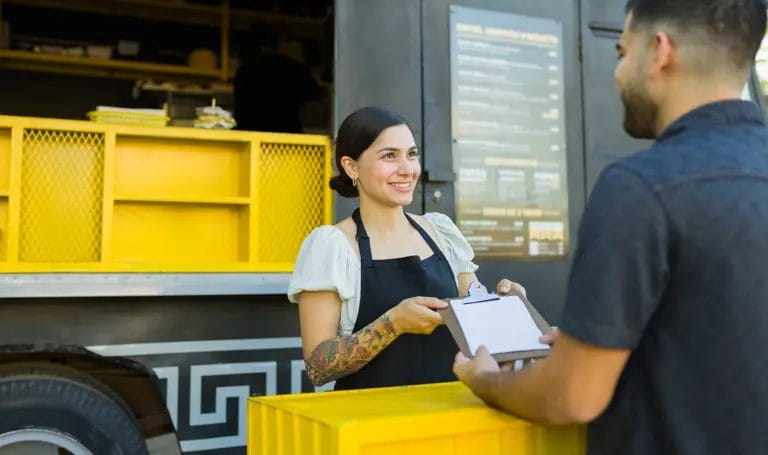“I feel like I’m forgetting something… but I’m not sure what.”
Sound familiar? Whether you’re bartending weddings for the first time this year or you’ve been at it for a while, this nagging feeling is a major stressor in an already hectic line of work.
That’s why we’ve assembled the ultimate wedding bartender checklist! Read up on the essentials and download your free copy.
Why Wedding Bartending Is Different — and Why the Prep Work Is Essential
As you book wedding bartender jobs, it’s critical to understand the difference between bartending at this type of event versus others, like corporate mixers or holiday parties.
These contrasts require prep work you may not have to do for other events, so understanding how weddings differ is vital. Approaching a wedding the same way you would a retirement party is a recipe for slow service, supply issues, and a very unhappy couple.
Pacing
With most other events, you can expect a fairly consistent demand for drinks. Because weddings typically follow phases (ceremony, cocktails, dinner, speeches, dancing, etc.), demand fluctuates throughout the night. It’s common to experience a rush following the ceremony and another after speeches wrap up.
Emotional Stakes
Every couple wants their special day to be perfect. It’s a celebration of their love, so it’s more personal than something like a work holiday party. This means a lot of pressure on them and the vendors they hire, like you.
Dress Code
Many couples want their wedding vendors to match the theme, or at least not stand out awkwardly in the background of photos. Expect to dress a little sharper than you would for a more casual gig. You might be asked to wear clothes that coordinate with their wedding colors.
Customization
It’s popular for couples to create signature cocktails for their wedding that coordinate with their wedding theme or represent some aspect of their relationship or personalities. This means preparing different quantities of specific syrups, garnishes, mixers, and alcohol for each wedding you work.
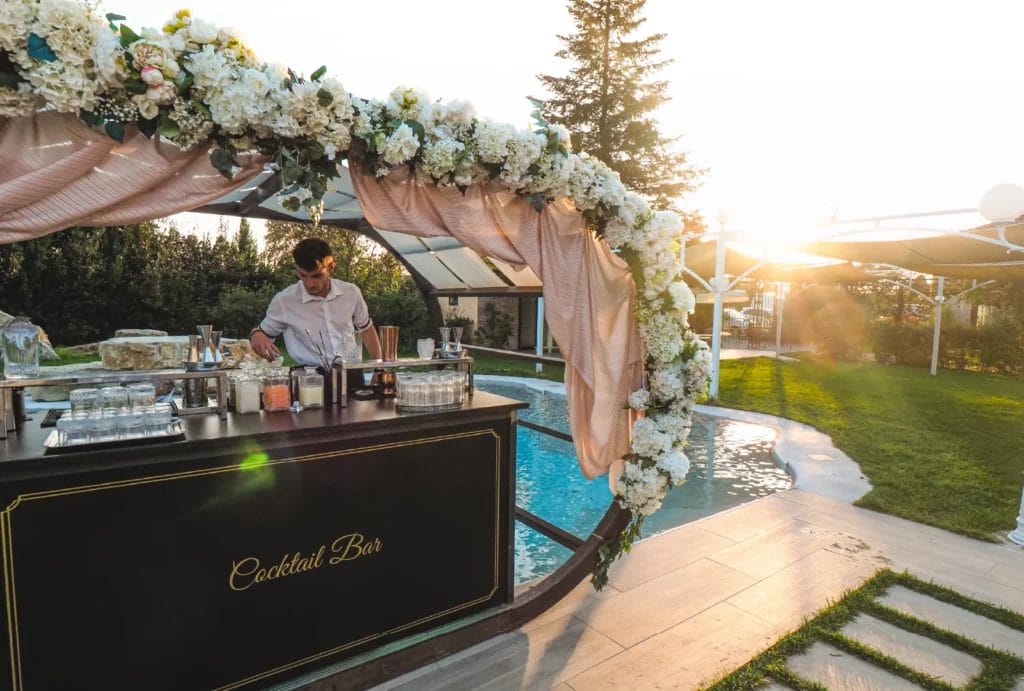
The Necessities: A Complete Wedding Bartender Checklist
Before you book your next wedding bartender gig, prepare the essentials and ensure you have everything you need to pull it off without a hitch!
While you might have a few special items to add to your list, depending on your clients’ requests, each of these categories contains the items every wedding bartender needs to succeed, from bar equipment to paperwork.
Bar Tools and Equipment
Most of the equipment you’ll need to make, pour, and serve drinks is the same stuff you need at any other event, which is handy! Even still, it’s a good idea to make sure you have everything packed and ready for the wedding — especially since the stakes are so high.
- Bar caddy for straws, stirrers, and napkins
- Bar mats
- Bar spoons
- Bar towels (at least five)
- Bottle opener
- Can opener
- Cocktail shakers (Boston or cobbler)
- Cutting board and paring knife
- Fine mesh strainer
- Hawthorne strainer
- Jiggers (1 oz. and 2 oz.)
- Mixing glasses
- Muddler
- Pour spouts for liquor bottles
- Spill-proof tray (if transporting drinks)
- Spray bottle with sanitizer
- Trash bin with liner
- Wine corkscrew
Beverage Inventory
The type of alcohol and mixers you need can vary depending on what the client requests (e.g., just beer and wine service versus a full bar), as does how much you need to pack.
A good rule of thumb is to assume each guest will have one drink per hour that the bar is open. Of course, not everyone will drink that much, but some people might have more and even things out.
No matter what you’re serving or how many guests are on the list, you can count on needing most of these for any wedding.
- Agave syrup
- Beer (bottles, cans, or kegs)
- Bitters
- Fresh garnishes (herbs, citrus fruits, celery, etc.)
- Ginger beer
- Grenadine
- Juices (orange, lemon-lime, etc.)
- Liqueurs (amaretto, triple sec, vermouth, etc. per your client’s drink menu)
- Non-alcoholic beverage options (sparkling water, juices, cans of soda, etc.)
- Simple syrup
- Soda
- Soda water
- Sour mix
- Spirits (bourbon, gin, rum, tequila, whiskey, vodka, etc. per your client’s drink menu)
- Tonic
- Wine (red, white, and sparkling per your client’s drink menu)
Pro Tip: Even if your client is purchasing and providing the alcohol for you to serve, you will still likely need to send them a list of what and how much to buy. Confirm with your client at least a couple of weeks in advance that they have the exact type and quantity of alcohol you need.
Glassware
Like alcohol, you need to confirm with your client if you are responsible for providing the glassware or if they will take care of that. Also, like alcohol, you need to ensure you have enough glassware to handle the size of the event without awkwardly running out.
Plan to have at least three times the glassware per person to make sure you don’t run out. People don’t tend to reuse their glasses throughout the wedding, so it’s safer to take the number of drinks you estimated each guest will drink and equate that to the amount of glassware you should have on hand.
Generally, your glassware checklist should look like:
- Beer glasses or pint cups
- Champagne flutes
- Disposable cups (if needed/requested)
- Drink dispensers (for water, tea, and/or coffee)
- Highball glasses
- Rocks glassesr
- Shot glasses (per clients’ request)
- Water pitchers
- Wine glasses (red and white)
Pro Tip: While many couples want real glassware at their wedding, there are times when you need to opt for disposable cups. This is common at outdoor venues, where it’s harder to pick up broken glass. Your client may request this, but always check with the wedding planner and/or venue to see if they require disposable drinkware.
Licenses, Insurance, and Other Paperwork
Alcohol serving and selling regulations can be strict depending on where you live, thanks to dram shop laws. As such, ensuring all your licenses, permits, and insurance policies are current and ready to show clients, venues, and wedding planners is crucial.
Bring all of the following with you to each wedding you work:
- Bartending permit (if required by your city, county, or state)
- Copy of your alcohol server certification (through TIPS, ServSafe, or other state-approved course)
- Copy of your liquor license (if you’re responsible for providing the alcohol)
- Copy of your wedding liquor liability insurance certificate, aka your Certificate of Insurance (COI)
- Incident log (to document any times you had to refuse service, patrons acted belligerent, etc.)
- List of guest allergies and dietary restrictions
- Signed contract/service agreement
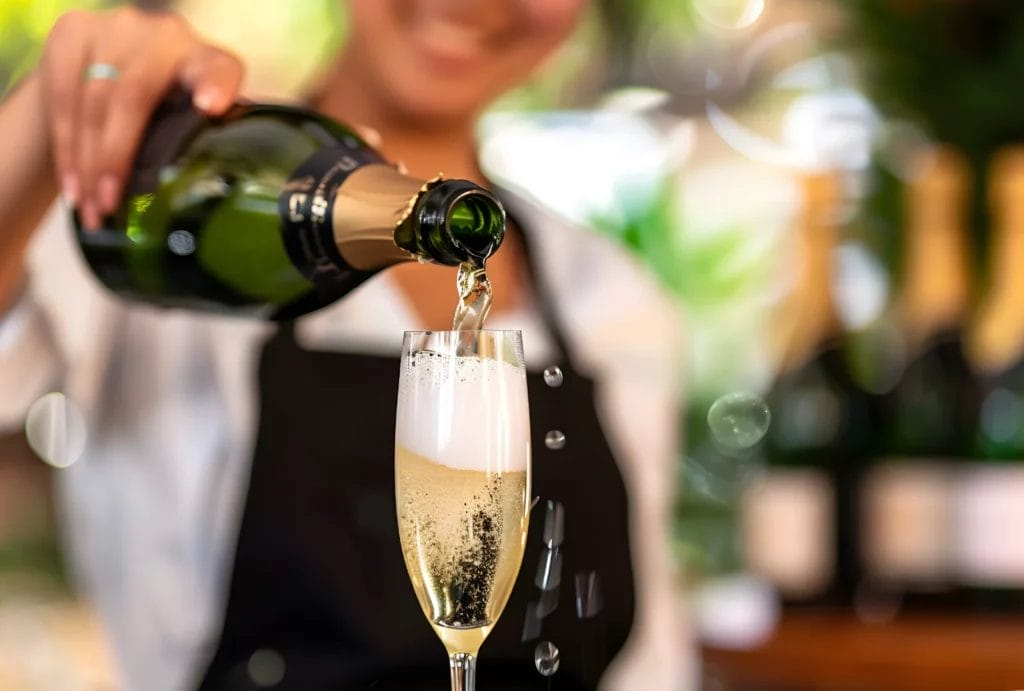
Ice and Cold Storage
Having the right equipment for cold storage is absolutely essential, especially for outdoor summer weddings. Nothing will ruin the mood like a warm glass of champagne for the first toast.
To keep things chill, make sure to pack the following:
- Coolers for beer, wine, and mixers
- Extra towels to wrap cold bottles (for presentation purposes)
- Freezer packs (a must-have for outdoor summer weddings)
- Ice (1.5-2 lbs. per guest)
- Ice buckets (at least two large ones)
- Ice scoop
- Speed rails or bar tubs for easy access
Set-Up and Clean-Up Supplies
When you’re focused on making stellar drinks for your guests, it’s easy to forget some of the essentials you’ll need to set up your bar and clean up afterwards.
Some of these items might already be available at the venue, like a broom or dustpan, but it never hurts to bring your own. Remember, you won’t be the only vendor there — you’ll likely share the space (and supplies) with caterers. Waiting for your turn to use the sanitizing spray can delay your setup or teardown time.
Bring these items so you’re fully prepared before and after the wedding:
- Bin for used glassware
- Broom and dustpan
- Folding bar/table
- Recycle bin
- Surface sanitizer spray or disinfecting wipes
- Table skirt/cloth (make sure it matches the wedding theme and/or your clients approve it!)
- Trash bags (you can never have enough — bring more than you think you need)
Emergency Kit
A wedding bartender’s emergency kit shouldn’t just include first aid supplies (although those are an important part of it). It should also include backups for critical items like bottle openers, which could derail the event if lost or broken.
Make sure your emergency kit includes:
- Backup bottle opener and corkscrew
- Duct tape
- First aid kit (pain relievers, bandages, etc.)
- Flashlight and/or headlamp
- Gaffer tape
- Hand sanitizer
- Lighter
- Portable sewing kit
- Stain remover pen (especially if you’re wearing white)
- List of contacts, including the wedding planner, couple, and/or venue manager
Client-Facing Signage
No matter what type of event you’re working, having signage at your bar is common. The difference you might experience at a wedding is needing to coordinate your signage with the couple’s aesthetic decisions for their big day.
For instance, if they’re having a rustic farmhouse-style wedding, they may want you to display your signage with chalkboards and white-washed frames. Always check with them to see if they have any requests or limitations for you to follow.
Add these items to your signage checklist:
- Frames, easels, or clip stands to hold signs
- List of bar rules (e.g., “Please have your ID ready”)
- Non-alcoholic drink station signage
- Signature drink menu board (may be chalkboard, painted, etc. at clients’ request)
- Tip jar sign (or QR code for tips via Venmo or CashApp)
- Water station signage
Bartending Attire
If you’ve bartended at casual events in the past, it will come as no surprise that the attire you’re expected to wear at a wedding might differ. Many couples are satisfied with a traditional all-black professional uniform, but others may want you to coordinate with their wedding colors or decor.
Like many aspects of your checklist, check with your clients beforehand to make sure you’ll meet their dress requirements. Generally speaking, you should have:
- Button-up shirt(black is the standard, but your client may request a different color)
- Clean, professional pants (no holes, most likely black unless your client requests a different color)
- Apron (branded if possible!)
- Non-slip work shoes
- Extra shirt and pants (in case of a spill)
- Lint roller
- Toothbrush
- Deodorant
- Name tag (if applicable)
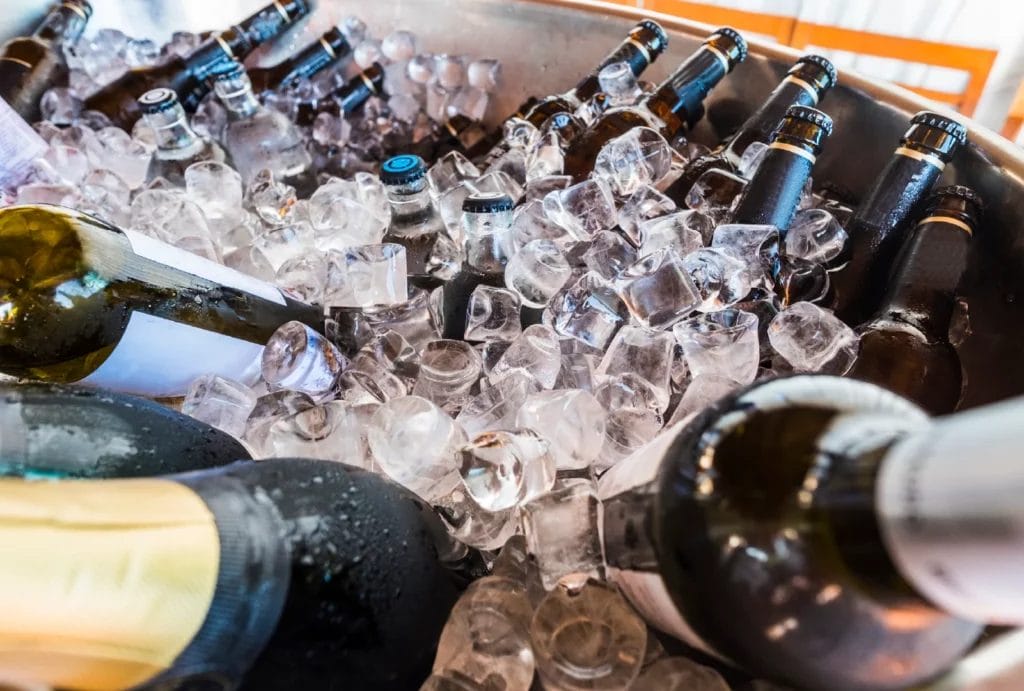
How to Use Your Checklist Effectively (and Not Just Tick the Boxes)
Follow these tips to get the most out of your wedding bartender checklist!
Get the Timing Right
Rushing through every item in your checklist the day before the wedding isn’t the right move. Instead, you should go through it at different intervals:
- 6–12 months before: Ideally, you should have a signed contract with the client by now, so this is a good time to ensure the rest of your paperwork is in order (license renewals, insurance coverage, etc.).
- 3–6 months before: By this point, you and the couple should agree on a bar menu. This includes any signature cocktails they want you to serve during the wedding. Most guests will have already RSVP’d by this time, so with a clearer headcount, you (or your client) can start ordering glassware.
- 1–3 months before: This is the best time to start ordering the amount of alcohol you’ll need, as well as any non-alcoholic beverages that won’t go bad before the wedding (like sodas). Take this time to review your equipment and attire checklist and see if you need to order or replace anything.
- Week of the wedding: Buy ice, garnishes, and other items that must stay fresh for the big day. It’s also a good idea to make sure the items you ordered 1–3 months before the event have arrived, in case you need to rush-order anything.
Stay Communicative
Many of the items in the checklist require communication with the couple, their planner, or even the venue. Be proactive and ask questions during each interval as you go through your list in the months leading up to the event (e.g., are you in charge of providing drink garnishes or will your client take care of that?).
Customize It
Because you need a new checklist for each wedding, and no two weddings are exactly alike, ours includes blank spaces for you to write your own items in each section.
Take advantage of these! Don’t just let the prewritten items guide you — use your checklist to keep a list of client requests, like what color tie the couple wants you to wear.
FAQs About Preparing for Wedding Season as a Bartender
Should a Wedding Bartender Carry Their Own Insurance?
Yes! In many states, you can be held legally responsible for the cost of injuries or property damage caused by someone you served alcohol to.
If one of the wedding guests drives home intoxicated and crashes their vehicle, you can be financially liable for any property they destroy or people they injure. Bartender liability insurance can cover some or all of these costs.
Plus, many clients, wedding planners, and venues require you to provide proof of insurance before working with you.
What’s the Best Way to Transport My Equipment Safely?
Use the following to reduce the chance of your equipment getting damaged on the way to the wedding venue:
- Padded bar bags
- Hard-shell cases
- Collapsible cart or dolly for loading and unloading
If your gear gets damaged on the way to a gig, tools and equipment (inland marine) insurance can cover some or all of the cost to repair or replace it! You can easily add this coverage to your wedding bartender policy during checkout.
How Early Should I Arrive at the Wedding Venue?
Most wedding bartenders show up two hours before the ceremony starts and finish setting up in that two-hour window. This way, they finish setting up before the ceremony begins and are ready to hit the ground running as soon as cocktail hour starts.
However, it’s a good idea to coordinate with your clients and/or their wedding planner to make sure you aren’t interrupting anything. Not every wedding follows the same schedule, so they may prefer you arrive at a different time.

